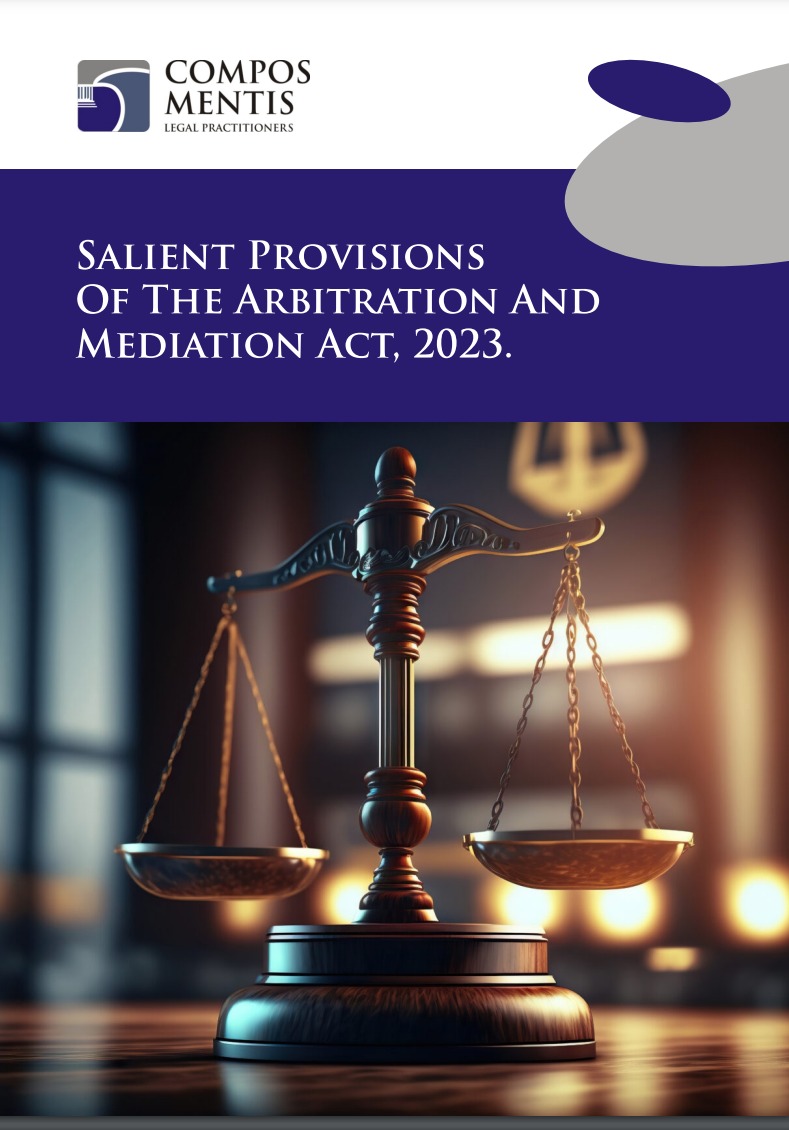Introduction: On May 26, 2023, former President Muhammadu Buhari gave assent to the then Arbitration and Mediation Bill (the Act). Section 90 of the Act repealed the Arbitration and Conciliation Act CAP A18 LFN 2004 (ACA). The Act has been greeted with enthusiasm due to its several innovative provisions. These legislative developments will elevate the practice of Arbitration and Mediation to a more efficient and effective practice. We have highlighted some of the key provisions of the Act below.
Part I (Arbitration)
Number of Arbitrators
The Act now provides that the arbitral tribunal shall consist of a sole arbitrator where there is no agreement as to the number of arbitrators[1]. This is contrary to the ACA which provided for three arbitrators where there is none appointed. This position is more cost-effective for the parties[2].
Appointment of Foreign Arbitrator
The Act prohibits the preclusion of foreign nationality in the appointment of an arbitrator unless the arbitration agreement otherwise provides[3].
Power of Appointment of Arbitrators
Unlike the ACA, the Act makes provision for parties to not only rely on the Court in exercising its power to appoint arbitrators but can now apply to any arbitral institution in Nigeria to appoint arbitrators when they have failed to do so.[4]
Challenging an Arbitrator
The Act has reduced the time within which a party who intends to challenge an arbitrator can do so to 14 days from when the arbitral tribunal was appointed or he became aware of the circumstances leading to the challenge rather than 15 days[5].
Immunity Clause
A significant innovation in the Act is the clothing of arbitrators, appointing authorities, and arbitral institutions with immunity in the discharge or ported discharge of their functions except if it can be shown that their actions or omissions were in bad faith. This statutory protection will encourage them to discharge their responsibilities without unnecessary apprehension[1].
Preliminary Questions
The Act provides that a party can request the Court to decide on a preliminary question on jurisdiction within 30 days after receiving the notice of the ruling by the arbitration on the preliminary question[2]. Contrary to the provision of the ACA that the ruling of the tribunal on preliminary objection is final and binding.
Removal of Limitations of Applicable Laws
Another notable change in the Act is that parties are at liberty to determine the jurisdiction whose law is applicable to the substance of their dispute, and arbitral tribunals are obligated to apply same[3]. It is no longer limited to cases relating to international commercial arbitration and conciliation[4]. There is no such limitation in the extant Act.
Emergency Arbitrators
The Act allows for the appointment of emergency arbitrators, by these provisions, parties now have the right to apply to the arbitral institution designated by parties or, in the absence of such designation, to the Court for the appointment of emergency arbitrators with a view to securing interim reliefs which cannot wait till the constitution of an actual arbitral tribunal[5]. The emergency arbitrator is to be appointed within two business days after the date of receiving the application[6].
Interim Measures
The Act contains comprehensive provisions governing the grant of preliminary orders and interim measures[7] by an arbitral tribunal including an obligation on the applicant to make full disclosure prior to and subsequent to the grant[8]; power of the arbitral tribunal to modify, suspend or terminate a preliminary order or interim measure on the ground of concealment of relevant facts, fraud, facts discovered subsequently, justice and equity; etc[9] as well as the provision of security by the applicant[10]. It is important to note that urgent interim measures by a competent Court are not deemed to be an infringement or waiver of the arbitration agreement[11].
Determination of Rules of Procedure
Another interesting provision is that parties are free to agree on the proceedings of arbitral tribunals are to be governed by the procedures agreed upon by parties and recourse may only be had to the Arbitration Rules where there is no arbitration agreement between or among parties to that effect[1]. This is contrary to section 15 of the ACA which did not recognize the right of parties to determine procedures to be applied. The extant provision will give parties greater control over arbitral proceedings.
Limitation Period
By the new Act, applicable statutes of limitation shall apply to arbitral proceedings as they apply to judicial proceedings[2]. Consequently, parties to an arbitration agreement who choose to be indolent do so at the risk of having their claims statute-barred. The limitation period for the enforcement of Awards now clearly excludes the period between the date of the commencement and the date the Award was delivered in the computation of time[3].
Consolidation, Current Hearings and Joinder
Another salient provision of the Act is that an arbitral tribunal may now order the consolidation or concurrent hearing of arbitral proceedings even where such include third parties provided that such order shall not be made without the agreement of parties[4].
The Act also empowers an arbitral tribunal to grant a joinder of an additional party to the arbitration, provided that, prima facie, the additional party is bound by the arbitration agreement giving rise to the arbitration[5].
Provisions relating to costs of arbitration which were under Part III of the ACA are now applicable to arbitration generally. In ACA, Part III was applicable solely to cases relating to international commercial arbitration and conciliation vide section 43.
By section 54 of the Act, an arbitral tribunal or arbitral institution has a right of lien on award pending when its fees and expenses are paid. See also, section 47(4).
Formation of Mechanism of Arbitral Award
Another laudable provision of the Act is that a party aggrieved with an arbitral award may apply to review the award to a second tribunal called the Award Review Tribunal (ART) on the same grounds outlined in section 55(3) of the Act[6]. This is an alternative to applying to the court. The ART is constituted in the same way as the tribunal in the original arbitration, parties can agree on the procedure for proceeding before the ART, the tribunal shall render its decision within 60 days from the date of its constitution and during this time any enforcement proceedings must be stayed pending the decision of the ART[1].
Third-Party Funding
Unlike the ACA, the Act has abolished the torts of maintenance and champerty against Third-Party Funding of arbitration. This section is applicable to arbitrations seated in Nigeria and arbitration-related proceedings in any court within Nigeria[2].
This is a long-awaited provision that is quite commendable as it will help businesses and corporate to access justice despite the rise in the cost of arbitration.
Part II -Introduction of Provisions on Mediation
Another groundbreaking feature of the Act is its introduction of provisions on mediation. The Act has replaced Conciliation as provided under the ACA. It is submitted that the definition of mediation in section 91(1) of the Act puts it clearly that mediation encompasses conciliation and other methods of ADR beyond arbitration. Part II of the Act is accordingly a welcome development.
By this section, when the mediation proceedings commence, the running of the limitation period regarding the claim that is the subject matter of the mediation is suspended. Where the mediation does not result in a settlement agreement, the limitation period resumes running from the time or day the mediation ended without a settlement. This will no doubt further encourage the adoption of mediation as it saves parties engaged in it the cost and energy that would have otherwise been expended in filing an action in court[3].
By Section 72 of the Act, there shall be one mediator unless the parties otherwise agreed. Notably also, unless otherwise agreed by parties, a mediator shall not act as an arbitrator in respect of a dispute that was or is the subject of the mediation proceedings or in respect of another dispute that has arisen from the contract or legal relationship or any related contract or legal relationship[4]. The Act clothes mediators with immunity except their action or omission is shown to be in bad faith[5].
Another outstanding innovation is that settlement agreement resulting from mediation is now binding on parties and enforceable in Court as a contract, a consent judgment or a consent award[6]. Additionally, section 87 stipulates the scope of application of the Singapore Convention in the enforcement of international settlement agreements made in States other than Nigeria resulting from mediation on the ground that the state is a party to the Singapore Convention and the dispute arises out of what would be considered a “commercial” legal relationship under Nigerian law.
Conclusion
With the delays and other challenges that occasion litigation as an age-long dispute resolution mechanism. A statute like the Act, with the objective to facilitate the practice of ADR and make it effective could not have come at a better time. Indeed, the various salient provisions of the Act have made Arbitration and Mediation a comprehensively attractive ADR mechanism. While there will always be room for improvement, the Act is seen as a positive development by the ADR community in Nigeria.
Download the PDF file below







Post a comment